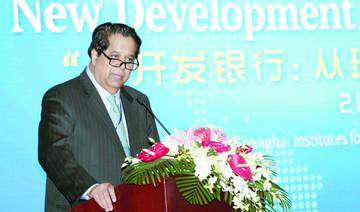SHANGHAI: The New Development Bank (NDB), set up by the BRICS group of major emerging economies, wants loans to the private sector to eventually take up a 30 percent share of its project portfolio, a senior executive at the bank said on Tuesday.
Xian Zhu, the NDB’s chief operating officer, said that the bank was targeting an overall 70-30 split between sovereign and non-sovereign loans in its project portfolio, and was seeing strong demand for private sector loans especially in Brazil, South Africa and Russia.
The Shanghai-based bank on Monday approved six new projects which brought its loan portfolio up to over $5.1 billion across 21 projects. Two of these were non-sovereign loans, which are issued to companies without a government guarantee.
“In India and China, there’s very strong demand for sovereign ... But on the other hand, some other countries for different reasons they probably prefer more non-sovereign lending,” he said.
“Some countries they still have some sort of fiscal difficulties. Secondly, the debt sustainability is a concern. They don’t want to borrow too much in sovereign terms. So they prefer you do more market transactions.”
The bank’s first non-sovereign project was a $200 million loan to Brazil’s Petrobras for an environmental protection scheme and the second a $200 million loan to South Africa’s Transnet to reconstruct a port in Durban.
Xian said that there was a gap in the market for them to fill as they were willing to make long-term loans with tenures of at least 10 years.
The NDB is seen as the first major achievement of the BRICS — Brazil, Russia, India, China and South Africa — since they joined forces in 2009 to press for a bigger say in the global financial order created by Western powers after World War Two.
BRICS development bank to expand lending to private sector
BRICS development bank to expand lending to private sector

Gold rises on Iran war safe-haven bid; firm dollar limits upside

BENGALURU: Gold prices rose on March 5, lifted by safe-haven demand amid an escalating war in the Middle East, while a stronger dollar and concerns around the US Federal Reserve’s monetary policy capped gains.
Spot gold was up 0.6 percent at $5,168.43 per ounce, as of 11:55 am Saudi time. US gold futures for April delivery were up 0.9 percent at $5,179.20.
Israel launched a large wave of strikes on Tehran on March 5, targeting what it said was infrastructure belonging to the Iranian authorities, after Iranian missiles sent millions of Israelis rushing into bomb shelters.
“On the one hand, there may be greater safe-haven demand for gold given the ongoing conflict in the Middle East. On the other hand, the risk of a prolonged period of higher energy prices that takes rate cuts off the table, and adds to the chance of rate hikes, could be capping further gains,” said Hamad Hussain, a climate and commodities economist at Capital Economics.
The US dollar rose about 0.3 percent after briefly retreating from three-month highs, as the fallout from the war roiled global markets and kept sentiment fragile.
Concerns about energy supply continued to drive up oil prices and stoke inflation fears.
Gold is considered a hedge against inflation in the long run, but also tends to thrive when interest rates are lower, as it is a non-yielding asset.
President Donald Trump, on March 4, officially nominated former Federal Reserve Governor Kevin Warsh to be the US central bank’s next chair.
US economic activity grew slightly, prices continued to increase and employment levels were stable in recent weeks, the Federal Reserve said on Wednesday in its latest “Beige Book” report.
Markets expect the Fed to keep rates steady at its next policy meeting on March 18, according to CME Group’s FedWatch tool.
Investors are looking out for the weekly US jobless claims data, due later today, and the US employment report for February on March 6 for further clues on monetary policy this year.
Spot silver rose 0.5 percent to $83.80 per ounce. Platinum gained 1.1 percent to $2,172.20, while palladium lost 0.7 percent to $1,662.07.












